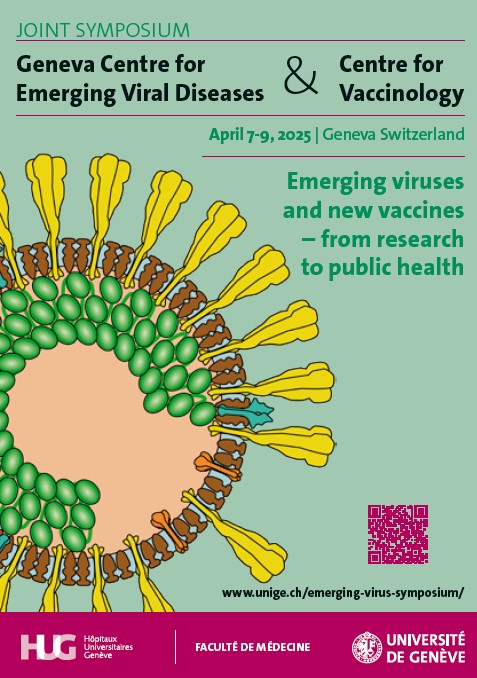
Joint Symposium from the Geneva Centre for Emerging Viral Diseases and the Centre for Vaccinology
April 7-9, 2025
"Emerging viruses and new vaccines -
From research to public health"
In person and online
Centre for Emerging Viral Diseases & the Centre for Vaccinology
"Emerging viruses and new vaccines - from research to public health", 7th to 9th April 2025, Campus Biotech
Viral diseases are as old as our species, yet new and old viruses keep surprising us. In recent years we have witnessed an unprecedented rise of emerging and re-emerging viruses, significantly impacting global health and society at large. The Covid-19 pandemic highlighted our vulnerabilities, but as we move past its acute phase, other health threats such as the mpox epidemic and the recent spread of H5N1 avian influenza emphasize the ongoing and continuous need for preparedness. But also endemic viruses have significant mortality and morbidity, and well-known viruses, once thought under control, such as measles or polio, are now re-emerging. Despite these challenges, health crises also drive innovation: particularly in vaccine development which offers potential solutions for prevention of diseases and transmission.
Our two Centres have been at the forefront of research on emerging viruses and vaccines for decades, and in line with our expertise and research we are pleased to announce the 4th symposium of the Centre for Emerging Viral Diseases, that is at the same time the 1st joint symposium together with the Centre for Vaccinology: "Emerging viruses, new vaccines and their public health impact".
The meeting will be held in Geneva on April 7th-9th 2025, and we will address questions such as:
Are we better prepared? What have we learned? How can we improve surveillance? How can we use the new technologies, where and when to apply them? Is our diagnostic toolbox ready? How quickly can we produce new vaccines and treatments? Who will have access to them, and who will benefit the most from them? What offers the best immune response, infection or vaccination? And is there a way to prevent new spillovers?
We will provide participants with a unique opportunity to foster exchanges and collaborations around high-level interventions given by world-class specialists on emerging viral diseases and vaccines. This two-day symposium will follow up three earlier successful and inspiring meetings on emerging viruses by bringing together scientists, public health experts and policy makers, this time complemented by a strong focus on vaccines and vaccination science and policy.
We hope that you will already mark the date in your calendar for this exciting joint symposium!
